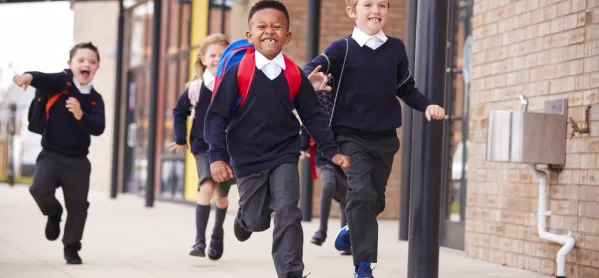More than 1m pupils off school due to Covid

More than 1 million state school pupils in England did not attend class last week for Covid-related reasons - a new record high since all students returned in March, government figures show.
An estimated 1.05 million pupils were out of school on Thursday 15 July - the equivalent of around one in seven (14.3 per cent), according to the Department for Education.
The Covid absence rate was highest among secondary students, at 17.9 per cent - up from 13.5 per cent the previous week.
Related: Schools not asked for this week’s Covid attendance data
Last week: 820,000 pupils off school as isolation soars
Need to know: How Covid contact tracing will work this week
Meanwhile, 12.1 per cent of primary pupils were off for Covid reasons on Thursday, compared with 9.8 per cent on 8 July.
Absence rates among staff have also continued to rise, with 6.6 per cent of teachers and school leaders and 6.4 per cent of teaching assistants and other staff missing school due to Covid last week - up from 5.4 per cent and 5.2 per cent on 8 July, respectively.
The news comes after Tes reported that schools are not being asked to provide the DfE with figures for Covid-related absences this week.
Of the 1.05 million pupils off for Covid reasons on 15 July:
- 773,700 were self-isolating due to a possible contact with a case of the coronavirus from inside school.
- 160,300 were self-isolating due to a possible contact with a case of the coronavirus from outside school.
- 47,200 had a confirmed case of the coronavirus.
- 34,800 were absent as a result of school closures due to Covid-19 related reasons.
- 34,500 had a suspected case of the coronavirus.
The attendance figures for state school pupils have been adjusted to exclude those Year 11-13 students not expected to attend because they are off-site, the DfE said.
Schools ‘need financial support to tackle Covid next term’
Geoff Barton, general secretary of the Association of School and College Leaders, said today’s figures “bring a year of unprecedented educational disruption to a grim end”.
“Our schools and colleges now face another set of challenges when students return in September,” he said.
“They need substantial financial and practical support for on-site asymptomatic testing for students, high-quality air ventilation systems and robust outbreak management plans.
“This work cannot be done on the cheap and the government needs to stop counting the pennies and address the situation with a proper injection of support and funding to allow leaders to prepare properly. We simply cannot have this level of disruption to education during the next academic year.
“We must pay tribute to the resilience and leadership of our schools and colleges as they have fought hard to keep young people in the classroom towards the end of an exhausting year of unrelenting pressure and challenge.”
Paul Whiteman, general secretary of school leaders’ union the NAHT, said: “The government’s reasoning behind removing ‘bubbles’ and school isolation requirements was to reduce disruption to children’s education and stop them missing school.
“But with cases rising, we are seeing more and more children actually off sick. Unless some action is taken to prevent transmission in schools, disruption to children’s education looks set to continue.
“The government’s own modelling predicts that the number of cases among children and young people is only going to get worse by the start of next term. Parents and school leaders will therefore be looking to government to take urgent action to drive down case numbers among school-age children.
“They will want to understand the rationale and scientific evidence that underpins the decision not to vaccinate children, and to know what steps the government is taking to implement alternative safety measures in key areas such as ventilation.
“Simply doing nothing and hoping for the best next term not only fails to address the problem, it risks making things worse.”
Meanwhile, public service union Unison, which represents support staff such as teaching assistants, caretakers and catering staff, said facemasks in schools should never have been ditched back in May.
Assistant general secretary Jon Richards said: “The government’s chaotic approach to relaxing restrictions is now approaching a free-for-all and this is the result.
“Hundreds of thousands of parents have been left high and dry in the last days of term, either forced to home school or dealing with childcare nightmares.”
You need a Tes subscription to read this article
Subscribe now to read this article and get other subscriber-only content:
- Unlimited access to all Tes magazine content
- Exclusive subscriber-only stories
- Award-winning email newsletters
Already a subscriber? Log in
You need a subscription to read this article
Subscribe now to read this article and get other subscriber-only content, including:
- Unlimited access to all Tes magazine content
- Exclusive subscriber-only stories
- Award-winning email newsletters